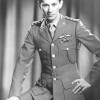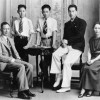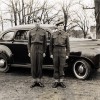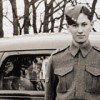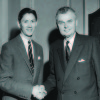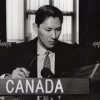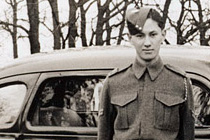
Born in Victoria, B.C. in 1924, he was the youngest of three boys and was fascinated by the allure of military life. Here is his story as told by the Vancouver Sun (May 25, 2017) in its series profiling 150 noteworthy British Columbians.
In February, 1946, war veteran Douglas Jung returned home to Vancouver from Australia. Reporters wanted to ask him about his military activities during the Second World War, but Jung couldn’t say a word about serving in a secret guerrilla unit.
When Japan entered the war, the British recognized the potential of using Chinese-Canadians as spies in Japanese-held territories. Jung was one of about 600 Chinese-Canadians who volunteered to fight — even though they still weren’t recognized as full Canadian citizens.
“We were people who, even denied the most fundamental rights of citizenship, acted as honourable citizens to serve our country in its hour of need,” he said at a military reunion of veterans in 1987. “And no one can take that honour away from us.”
It wasn’t until 1947 that Chinese-Canadians were given the right to vote.
Jung was the son of Jung Yik Ching, who came from the village of Ngow Pei Hong in Guangdong. Douglas Jung’s name comes from the place of his birth on Douglas Street in Victoria.
At the time, anyone of Chinese heritage couldn’t enter professions such as medicine or law. They couldn’t buy property in certain neighbourhoods such as Shaughnessy and the British Properties. And until 1947, Canada had a national policy barring immigrants from China.
“You have to understand the kind of country Canada was then,” he told The Vancouver Sun. “There was no such thing as a Chinese-Canadian. The Chinese — even if they were born in Canada — didn’t have the right to vote, weren’t recognized as citizens, couldn’t practice certain professions.”
Jung graduated from the University of B.C. in law. In 1957, he ran in the federal riding of Vancouver-Centre as a Progressive Conservative. He surprised everyone by defeating a Liberal cabinet minister and joining the government of John Diefenbaker. Jung became the country’s first Chinese-Canadian Member of Parliament.
Diefenbaker appointed Jung as the country’s representative to the United Nations. At UN Headquarters in New York on his first day, he went to take his seat. The moment was bittersweet, however. Jung was told to leave — a security guard said the spot was reserved for the official representative of Canada.
In 1988, he travelled to the village of father’s birthplace in China. The visit was big news because of Jung’s fluency in Cantonese and his height of 182 cm (six feet). It was also a rarity for Chinese villagers to see an elected politician.
The emotional highlight came when he stood by the cornerstone of the house his father left when he came to Canada.
“My father never returned to China, and I had never been there,” he said. “But when they took me to where my father had lived, I felt that I was on a pilgrimage for him.”
A DVD on the life of Douglas Jung, “I Am The Canadian Delegate”, produced by Wesley Lowe, is now available at Filmwest. Here is a shortened version of that film.
Gallery
- Douglas Jung
- The Jung Brothers (l-r: Douglas, Arthur, Ross)
- Douglas Jung with John Ko Bong
- Douglas Jung
- Douglas Jung with Prime Minister John Defienbaker
- Douglas Jung, MP
